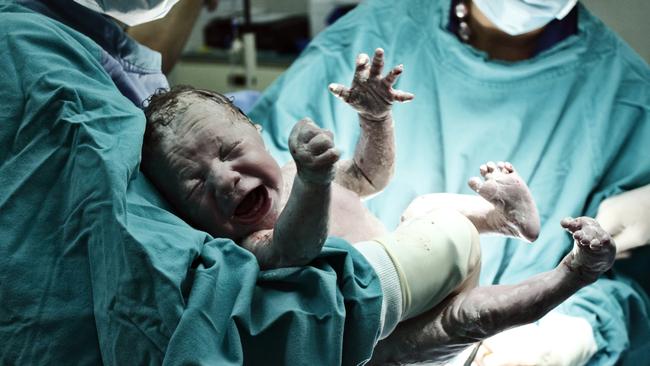Swedish study links Caesarean births to autism and ADHD
A controversial study that links Caesarean births to autism and ADHD has sparked a warning from Australian experts who say the results are “unreliable”.
VIC News
Don't miss out on the headlines from VIC News. Followed categories will be added to My News.
Children born through Caesarean deliveries face a greater chance of having autism or attention-deficit hyperactivity disorder according to the findings of a controversial international study.
As C-section rates increase around the world the findings by Swedish researchers have prompted calls for greater investigation into potential links with neurodevelopmental and psychiatric disorders.
However, Australian experts have called for caution over the “unreliable” results, warning they may be skewed because researchers combined results from 61 unrelated studies in making their conclusions.
After reviewing data from more than 20 million births gathered during the previous international studies, the Karolinska Institutet team found the chances of developing autism spectrum disorder were 33 per cent higher for children born via C-section.
Results published overnight in theJournal of the American Medical Association also indicate a 17 per cent greater chance of ADHD among children born through Caesars.

Although the researchers did not pinpoint a reason why C-section deliveries were linked to increased rates of the conditions, they said future studies to uncover the mechanisms were warranted.
“The results appear to further add to the known adverse health outcomes associated with Caesarean delivery and suggest judicious use of Caesarean delivery,” the Karolinska Institutet researchers found.
“The findings suggest that Caesarean delivery births are associated with an increased risk of autism spectrum disorder and attention-deficit/hyperactivity disorder, irrespective of Caesarean delivery modality, compared with vaginal delivery.”
But clinical director of Melbourne IVF at the Royal Women’s Hospital, Dr Alex Polyakov, questioned the legitimacy of combining data from so many unrelated studies, which was collected under differing circumstances.
“The old saying from computer science: ‘garbage in, garbage out’ seems to apply, as poor quality input will invariably produce sub-optimal output,” Dr Polyakov said.
“Overall, it must be stated that both caesarean section and vaginal delivery have risks for mothers and babies.
“These risks are not the same and there is no consensus as to which mode of delivery is better overall.
“The study adds another possible risk to indiscriminate utilisation of caesarean section as the preferred mode of delivery, but it must be balanced against recognised risks of alternative delivery strategies.”
The University of Queensland’s Associate Professor Gino Pecoraro said the Swedish review would “inflame” already heated discussions over Caesarean births, but raised important questions despite having significant limitations.
MORE NEWS:
AMBO’S REACT AS DRUG-FUELLED THUG WALKS
PARENT: BERWICK STUDENT ‘PUNCHED’ TEACHER
RESIDENTS FEAR NEW PLAN AN ‘INVITATION’ TO JUNKIES
“This study is certainly interesting and begs further prospective research be undertaken to try and answer the question of whether delivery by cesarean section increases the burden of mental health issues in children,” Assoc Prof Pecoraro said.
“Ultimately, this study does not answer this question, but merely comes up with the correct recommendation that ‘further research is required’.”
Professor Alastair MacLennan, head of the Australian Collaborative Cerebral Palsy Research Group, said the Karolinska Institutet team’s conclusions were “very unreliable” because of the way various studies were combined.
“Genetic causes are now being confirmed for many of these neurodevelopmental disorders and they are unaffected by obstetric management,” Prof MacLennan said.


